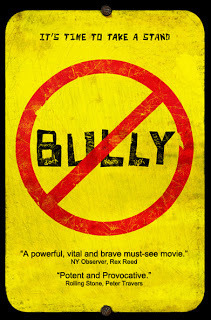Write (or direct) what you know
 Has anyone seen the movie, "Bully"? Darwin and I went this weekend and have been talking about it since. If there hadn't been people around me in the theater, I would have sobbed out loud and not choked it back over some of the stories of kids who are bullied on a daily, and sometimes hourly basis at school, on the bus, etc.
Has anyone seen the movie, "Bully"? Darwin and I went this weekend and have been talking about it since. If there hadn't been people around me in the theater, I would have sobbed out loud and not choked it back over some of the stories of kids who are bullied on a daily, and sometimes hourly basis at school, on the bus, etc. There is nothing flashy or rehearsed about the film-making, either. Experts don't interject or weigh in, statistics aren't splashed across scenes, and easy answers aren't given. What unfolds are heartbreaking stories, raw courage, ineptness on the part of some adults, and a call to action by others--particularly parents who have lost a bullied child through suicide.
We also went to a panel discussion yesterday at UNI, which included the director, Lee Hirsch and producer, Cynthia Lower. What was most interesting to me was the "why" behind the project? What drives a director to take on a documentary like this?
When I came home, I read this interview with Lee Hirsch and discovered the answer...
“I felt that the hardest part of being bullied was communicating,” Hirsch said. ”And getting help. I couldn’t enroll people’s support. People would say things like ‘get over it,’ even my own father and mother. They weren’t with me. That was a big part of my wanting to make the film. It’s cathartic on a daily basis." Hirsch said he hoped the film grows far beyond him, inspiring advocacy, engagement, and empowerment not just in people who are being bullied and in their families, but by those of us who all too often stand by and do nothing. He stated, “I hope we build something that’s really sustainable. I hope this takes on a life of its own.”
This is a hall of fame example of "write what you know" and how that knowing can be used to change the world.
Published on May 02, 2012 09:15
No comments have been added yet.



